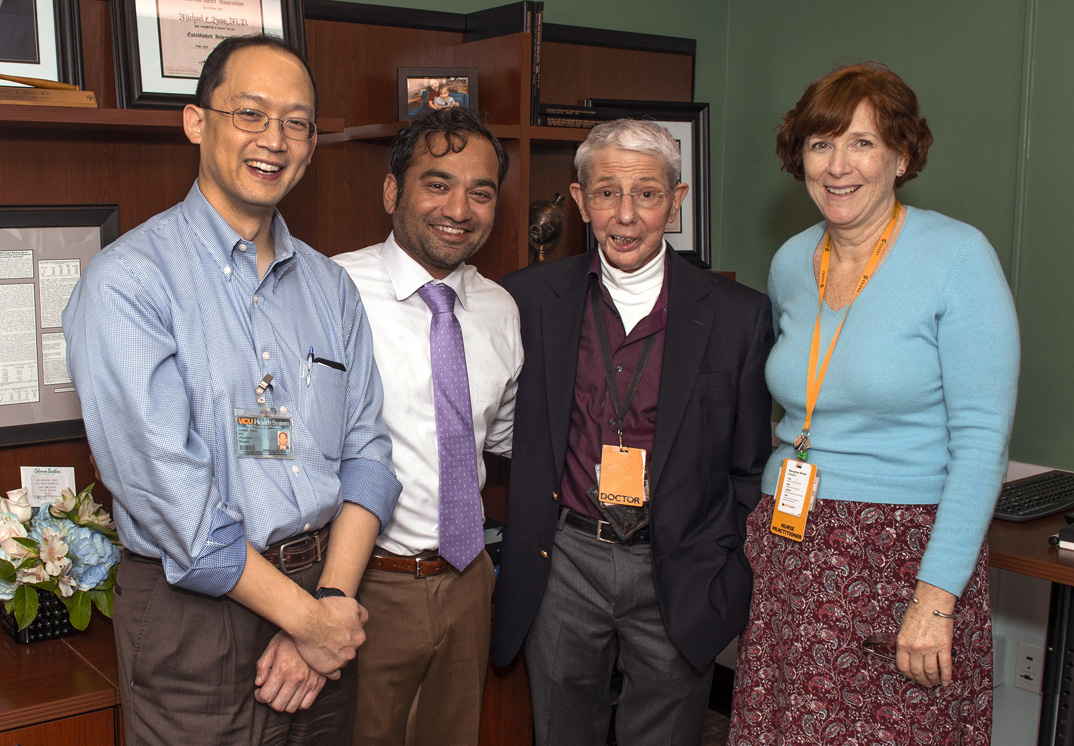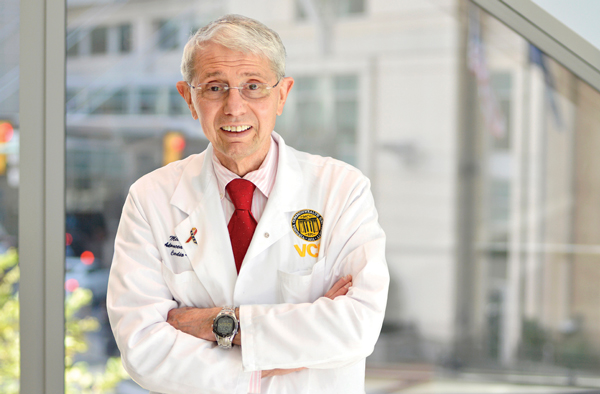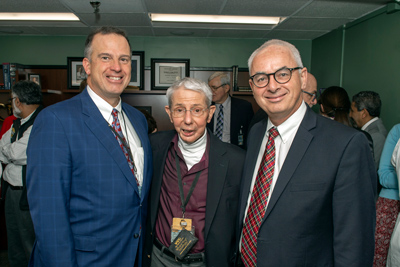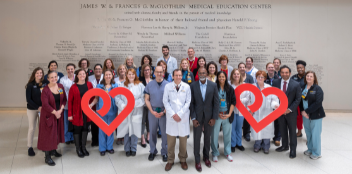Remembrance: Dr. Michael Hess

With great sadness, VCU Health announces the passing of Dr. Michael Hess in Richmond on April 13, at the age of 76, following a long illness. Although he is no longer with us, his love of patients and teaching, and his significant contributions to the fields of heart failure, heart transplantation and cardio-oncology will be remembered for many years.

Dr. Michael Hess was a small man, but he arrived in rooms with a booming voice and a large presence.
“He was a bit of a whirling dervish. A force of nature,” said Maureen Flattery, a nurse practitioner in cardiac transplantation who worked with Hess for more than 20 years. But, she added, his energy drove him to great accomplishment—from his innovative work with Dr. Richard Lower in the early days of cardiac transplantation and his creation of the International Society for Heart and Lung Transplantation (ISHLT), to his coming out of retirement in 2013 to start the cardio-oncology program at VCU Health.
Dr. Greg Hundley, director of VCU Health Pauley Heart Center, remembers Hess from his years as a student at VCU School of Medicine. “He was on the faculty then, and he was an internationally respected leader in cardiovascular physiology and also formative in many of the medical management issues related to cardiac transplantation,” he said. “He was a unique blend of friendliness and exceptional expertise in his craft.”
“He was a true giant in the field of medicine. Very few people accomplish in their career what he did in the first 20 years of his career,” said Dr. Kenneth Ellenbogen, chair of the Division of Cardiology in VCU’s School of Medicine. “He was a completely unselfish teacher, and an amazing physician and human being. So many people owe their lives to him. He was responsible for the field of heart transplantation getting off the ground. I don’t know how we could all ever thank him for everything he did for this field.”
Born in the small coal mining town of Philipsburg, Pa., on August 10, 1942, Hess attended St. Francis University, then the University of Pittsburgh Medical School, where he met and married his wife, Dr. Andrea Hastillo, who, like him, later became a VCU Health cardiologist. At Pittsburgh, he embarked on several pivotal studies in the physiology of the heart with Dr. Norman Briggs, and joined VCU’s Physiology faculty in 1971. Hess completed his fellowship in cardiology at VCU and earned a Young Investigators Award from the American College of Cardiology in 1972. After serving two years in the U.S. Navy as a clinical cardiologist, he also joined VCU’s Internal Medicine faculty in 1975. He was named a professor of both cardiology and physiology, and published more than 200 research papers.
Hess received many honors over the years, including VCU’s University Award of Excellence as well as its Distinguished Clinician, Distinguished Scholarship, and Distinguished Clinical Care awards. He was recognized seven times with the university’s Outstanding Teacher Award, an honor given annually by medical students, and was named the Outstanding Teacher for Advanced Cardiovascular Physiology four times. Colleagues describe him as a great storyteller, who loved to share a laugh with others.
Early in his career, Hess partnered with Dr. Richard Lower, a pioneering cardiac transplant surgeon. “It started as a hallway conversation in the West Hospital,” Hess once recalled. It was a Friday when he introduced himself to Lower and expressed an interest in caring for his post-transplant patients. “He looked me square in the eye, and he said, `Well I have two new patients coming into the clinical research unit Monday morning. Go to work on them.’”
During those years, Lower demonstrated the ability to preserve the hearts of donors for four hours, and with Dr. Szabolcs Szentpetery, undertook the world’s first long-distance heart transplant in May 1977.
In an interview, Hess recalled spending Tuesday nights on Lower’s porch with esteemed colleagues like Dr. H.M. Lee, “trying to pound out the problems that we were having at the time.” The problems in the 1970s and 1980s included high mortality rates for transplant patients and the fact that “the world of cardiac transplantation was so young that there were no rules, no guidelines,” he said.
At a 1981 meeting of the American Medical Association, Hess co-founded the ISHLT, a network for professionals in the fledgling transplant field. He claimed, “I had no one to talk to.” Hess served as the first president of the society.
Today, the organization is the world’s leading scientific society of transplantation physicians and surgeons and operates the International Registry for Heart and Lung Transplantation, the only database of its kind in the world.
In addition to his work with Lower and the ISHLT, “he was an excellent educator and clinician. His first concern was the patient and his second was to teach people how to take care of patients,” said Flattery. “His patients loved him. He always amazed me, because he’d walk into a patient’s room and say, `so how’s that grandson of yours doing? Is this the year he’s graduating?’” He instructed Flattery to remember something unique about each patient, “to show that you’ve been listening to them.”
One of his grateful patients was George Crutchfield, who was treated by Hess for 34 years. Before he died, his wife, Frances Broaddus-Crutchfield, hosted a luncheon to celebrate their many years together as doctor and patient. She later established the George and Frances Broaddus Crutchfield Lecture Series to provide for continuing education in heart failure medicine.

Hess served as a mentor for countless students, including Dr. Keyur Shah, section chief of heart failure at VCU Medical Center, who described his great passion for teaching. “He would spend any free moment he had to either give lectures to nurses about EKGs or sit down with students to discuss the pathophysiology of heart failure. He’d always be the first to volunteer to give lectures—really just enjoyed the academic environment,” said Shah. “He was a great educator, and he taught students from lessons he’d learned over his life and career.”
Hess was devoted to his wife and daughter, endocrinologist Dr. Samantha Hudson, and their extended family. In his spare time, he enjoyed reading, spending time with his loved ones, and watching his beloved Pittsburgh Steelers play.
He had a hard time leaving the profession.
“I think he retired three times,” said Flattery.
After one short-lived retirement, he returned to VCU Health to start Virginia’s first cardio-oncology program in 2013. He retired for good in 2017 but stayed engaged. In December 2017, the Journal of Heart and Lung Transplantation published a special issue dedicated to the 50th anniversary of the first human heart transplant, with Hess co-authoring the first chapter.
Recently, he led a Grand Rounds presentation on the history of cardiac transplantation, receiving a standing ovation. On December 8, 2018—the date of his and Hastillo’s 50th wedding anniversary–he traveled to VCU Medical Center for the unveiling of the Dr. Michael Hess Library in the West Hospital.
Along with his family, “medicine, his patients, his students were his life. He was fully committed to the field. VCU Health and heart failure were his passion from beginning to end,” said Shah. “He was very resilient, the fact that he came back and started a successful cardio-oncology program just speaks to not only his motivation but his passion to be involved in clinical medicine this late in his career.”
To read more about Dr. Hess’s legacy, please see:
A Long, Storied History: Dr. Michael Hess
TOP PHOTO:
DR. MICHAEL HESS LIBRARY DEDICATION / (L-R) DR. DANIEL TANG, DR. KEYUR SHAH, DR. MICHAEL HESS, MAUREEN FLATTERY, NP
CENTER: DR. MICHAEL HESS
BOTTOM PHOTO: (L-R) PAUL WESOLOWSKI, DR. MICHAEL HESS, DEAN DR. PETER F. BUCKLEY
Back to Spring-2019
Join our Pauley Consortium composed of patients, friends and advocates.

